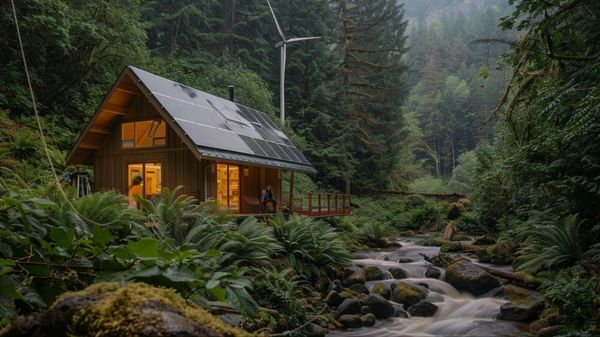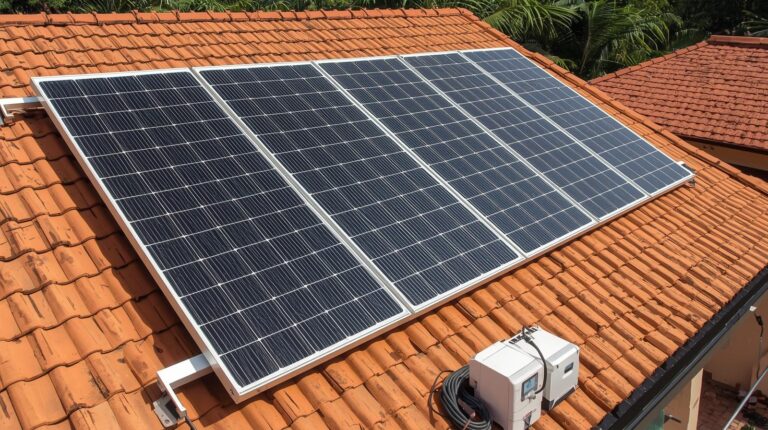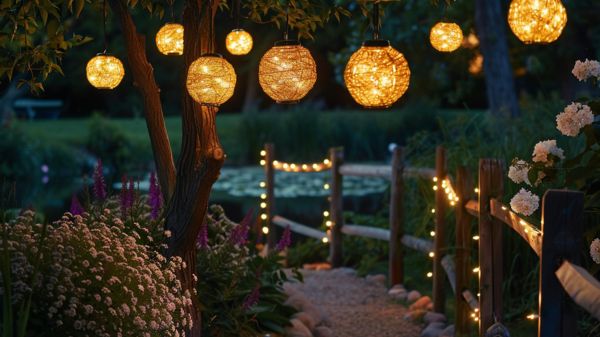For ideal off-grid living, you should consider a mix of power systems. Solar power systems offer energy independence and reduced reliance on fossil fuels, with efficient panels and charge controllers to manage energy effectively. Wind turbines provide reliable energy even in low-sunlight conditions when strategically placed.
Hydroelectric systems offer consistent energy from flowing water, while biomass solutions utilize organic materials for sustainable power. Backup generators are essential for emergencies, and combination setups integrate multiple sources for reliability.
This thorough approach guarantees efficiency and sustainability, catering to varying energy needs effectively. Further exploration can provide detailed insights into maximizing off-grid power solutions.
Key Takeaways
- Solar power systems offer energy independence and efficiency for off-grid living.
- Hybrid energy solutions combining wind and solar ensure consistent power generation.
- Micro hydro systems provide a reliable and sustainable energy source for off-grid setups.
- Biomass energy solutions offer renewable resources and reduce carbon emissions effectively.
- Combination power setups with battery storage and renewable integration enhance reliability and sustainability.
Solar Power Systems
When considering the best power system for off-grid living, solar power systems stand out as a popular and efficient choice.
Solar panel efficiency plays an essential role in maximizing the power generation from the sun’s rays, guaranteeing you have ample electricity for your needs. Opt for high-efficiency solar panels to make the most of the available sunlight and increase your energy independence. Additionally, selecting the right charge controller is crucial for efficient energy conversion and battery management.
Wind Turbines
For off-grid living, Wind Turbines offer a reliable alternative power source to supplement solar energy. Wind turbine efficiency is an essential factor when considering this option.
These turbines can be an excellent addition to your power system, harnessing the power of the wind to generate electricity even when the sun isn’t shining. When it comes to wind turbine installation, proper placement is key to maximizing their efficiency.
Here is a comparison of wind turbines with solar panels:
| Feature | Wind Turbines | Solar Panels |
|---|---|---|
| Energy Source | Wind | Sun |
| Efficiency | Dependent on wind speed | Consistent sunlight |
| Installation | Requires open space | Rooftop or ground-mounted |
Consider adding wind turbines to your off-grid setup for a more robust power system that can operate even when sunlight is limited. The efficiency of wind turbines combined with solar panels can guarantee a steady power supply for your off-grid lifestyle. The hybrid capabilities of the Auecoor 800W kit provide a reliable hybrid energy solution for diverse off-grid applications.
Hydroelectric Power Options
When considering hydroelectric power options for off-grid living, you’ll find a range of choices tailored to different needs. Small-scale hydro options offer a reliable and sustainable energy source, but they come with their own set of pros and cons. Maintenance considerations play a vital role in ensuring the efficiency and longevity of your hydroelectric power system.
Small-Scale Hydro Options
Consider harnessing the power of flowing water for your off-grid energy needs with small-scale hydro options.
Micro hydro systems utilize the natural movement of water to generate electricity, providing a reliable and sustainable power source for your remote living setup. By tapping into the steady flow of a stream or river on your property, you can create a consistent energy supply that isn’t dependent on external factors.
The key to a successful micro hydro setup lies in understanding the water flow available to you and designing a system that can efficiently capture and convert this energy into electricity.
With advancements in technology, small-scale hydro options have become more accessible and easier to implement, offering you the opportunity to become self-sufficient in powering your off-grid lifestyle.
Embrace the power of water and explore the potential of micro hydro systems to liberate yourself from traditional grid constraints.
Pros and Cons
Harnessing hydroelectric power for your off-grid energy needs presents both advantages and disadvantages. When considering hydroelectric power options, it’s essential to weigh the following factors:
Advantages:
- Energy Independence: Hydroelectric power provides a reliable and constant energy source, reducing reliance on external power grids.
- Environmental Impact: It’s a clean and renewable energy source, contributing to sustainability efforts.
- Efficiency Ratings: Hydroelectric systems boast high efficiency levels, ensuring peak energy production.
- System Scalability: These systems can be designed to match varying power demands, offering flexibility.
- Technology Advancements: Ongoing advancements enhance system performance and energy output.
- Community Resources: Hydroelectric projects can often leverage local water resources, fostering community engagement and development.
Disadvantages:
- Cost Analysis: Initial installation costs can be high, requiring thorough financial planning.
- Installation Challenges: Setting up hydroelectric systems may pose technical challenges, especially in remote locations.
- Power Storage: Storing excess energy can be complex and costly.
- Regulatory Considerations: Compliance with regulations and permits is necessary, adding to the complexity of implementation.
Maintenance Considerations
To maintain the efficiency and longevity of your hydroelectric power system, regular upkeep and monitoring are essential. Here are some key maintenance considerations for your off-grid hydroelectric system:
Battery Maintenance
- Regularly check the water levels in your batteries and top them up with distilled water as needed to guarantee peak performance.
- Keep the battery terminals clean and free of corrosion by using a mixture of baking soda and water to scrub them gently.
Inverter Care
- Inspect the inverter regularly for any signs of wear or damage and address issues promptly to prevent further complications.
- Confirm proper ventilation around the inverter to prevent overheating and maintain its efficiency.
Biomass Energy Solutions
Biomass energy solutions offer a sustainable and renewable option for off-grid living. By utilizing organic materials such as wood pellets, crop residues, and animal waste, biomass can generate power efficiently.
Understanding the benefits of biomass energy and exploring its diverse sources can help you make informed decisions on the best power system for your off-grid lifestyle.
Biomass Benefits Explained
With its renewable and sustainable nature, biomass energy provides a plethora of benefits for off-grid living. Here are four reasons why biomass is a fantastic choice for powering your off-grid lifestyle:
- Renewable Resource: Biomass is derived from organic materials like wood, crop residues, and animal waste, making it an abundant and renewable energy source that can be replenished naturally.
- Reduced Carbon Emissions: Biomass energy is considered carbon-neutral since the carbon dioxide released during combustion is offset by the carbon dioxide absorbed by the plants during photosynthesis, making it an environmentally friendly alternative to fossil fuels.
- Waste Reduction: Biomass energy allows for the conversion of agricultural and forestry waste into useful energy, providing a sustainable solution for managing organic waste materials.
- Energy Independence: By harnessing biomass energy, you can reduce your reliance on traditional power sources, giving you more control over your energy production and consumption, leading to greater self-sufficiency in off-grid living.
Biomass Energy Sources
Derived from a variety of organic materials such as wood, crop residues, and animal waste, biomass energy sources offer a diverse range of solutions for off-grid living. When considering biomass energy sources, it is crucial to explore various aspects such as biomass conversion, sustainability, technologies, applications, and storage methods.
To better understand the capabilities of biomass energy, let’s investigate a comparison of different biomass energy sources:
| Biomass Energy Source | Characteristics |
|---|---|
| Wood | Widely available, can be used for heating and electricity generation |
| Crop Residues | Agricultural by-products that can be converted into biofuels |
| Animal Waste | Rich in organic matter, suitable for biogas production |
| Algae | Fast-growing biomass used for biofuels and wastewater treatment |
Generator Backup Systems
When considering generator backup systems for your off-grid living setup, reliability and efficiency are vital. Here are some essential aspects to keep in mind:
- Generator Sizing: Verify your generator is appropriately sized to meet your power needs without being oversized, which can lead to inefficiencies.
- Fuel Types: Consider the availability and cost of fuel types such as diesel, propane, or gasoline when selecting a generator that aligns with your off-grid setup.
- Maintenance Tips: Regular maintenance is important for peak performance; follow manufacturer guidelines for upkeep to guarantee longevity.
- Portability Options: If mobility is necessary, opt for a generator with convenient portability features for ease of transport during off-grid adventures. Additionally, ensure that the generator is easily portable for off-grid living.
Combination Power Setups
For ideal power efficiency in off-grid living, evaluating combination power setups can enhance your system’s reliability and versatility. By combining different power sources and technologies, you can achieve a more robust and sustainable off-grid power system. Here are some key elements to evaluate when setting up a combination power system:
| Keywords | Description |
|---|---|
| Battery Storage | Efficient storage of excess energy for later use |
| Energy Efficiency | Maximizing energy output while minimizing waste |
| Grid Independence | Operating autonomously from the main power grid |
| Renewable Integration | Incorporating renewable energy sources for sustainability |
| Load Management | Balancing energy supply and demand efficiently |
| System Scalability | Ability to expand or reduce the system based on needs |
| Hybrid Solutions | Combining different power sources for optimal performance |
| Energy Resilience | System’s ability to withstand disruptions and outages |
| Power Reliability | Consistent and dependable power supply |
| Sustainable Practices | Environmentally friendly power generation methods |
| Cost Considerations | Considering the initial investment and long-term savings for off-grid living |
Conclusion
To sum up, the best power system for off-grid living is a combination of renewable energy sources. While each option has its own advantages, a mix of solar power, wind turbines, hydroelectric power, and biomass energy solutions can provide a reliable and sustainable energy supply.
Backup generator systems can also offer additional support during periods of low renewable energy production. So, when it comes to off-grid living, why settle for just one power source when you can have them all?




